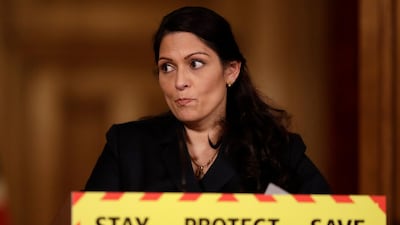When British Home Secretary Priti Patel launched an attack on social media influencers earlier this month, there was a suspicion that instant polling must have indicated that her lines would resonate.
Britain's beleaguered government has seen the country's total Covid-19 death toll double since November. With the public worried and frustrated, Mrs Patel, who is in charge of law and order, made the influencers – glossy creatures of the party scene – an instant target. This scapegoating quickly triggered a raft of newspaper columns and talk radio chatter condemning the influencer trend. Much wrong-headed commentary was set off. This deluge was about disguising the true issues that have seen infections soar and hospitals strain.
Influencers can easily be set up as fall guys, but doing so ignores the reality that this new breed of public figures cannot be wished away. Influencers' presence in Dubai was, in particular, singled out. Some of those in the spotlight said they had flown to the emirate to keep their own livelihoods going in the face of a bleak lockdown at home.
The blame game was a particularly fruitless exercise, given that the third wave of infections was already inevitable. When the UAE travel corridor with the UK came into being in November, it was permitted for UK residents to travel abroad for business but the authorities made no effort to stop people going abroad for leisure.
Likewise, the UK daily infection rate was on a downward trend. The idea that the country would be a significant exporter of Covid-19 could not be foreseen by the architects of the land corridor. The emergence of the UK variant, which now represents more than 90 per cent of infections, was a game changer. It was not detected until later in the year.
When Prime Minister Boris Johnson announced on January 4 the country's latest lockdown to suppress the virus, he warned that the new variant was up to 70 per cent more contagious. “We now have a new variant of the virus. It has been both frustrating and alarming to see the speed with which the new variant is spreading,” he said in a televised address.
Ten days later as concerns grew within the UK and beyond, the French border post at London's St Pancras railway station stopped a group of travellers on a skiing trip to Switzerland. In a social media post, the train company warned that a ski holiday was not "essential travel". It wasn't until January 27 that the London government began making clear that under the stay-at-home regulations, it was illegal to leave home to travel abroad for leisure purposes.
Mrs Patel subsequently launched her blitz on influencers, implying cause and effect where none such exist. It is lucky that there is no finger-pointing in the other direction. Suddenly, UK officials are performing an intellectual helix that the images and messages on influencers social media accounts have in some way fed into the serious problems confronting the UK.
The assault on influencers is jarring, but it would be merely futile if it was also not a distraction.
When the 18th-century patrons of Lloyd's Coffee House in London were provided with a daily newspaper, they were at the beginning of a technology that was to change the world. The world of influencers may seem more frivolous. It may even raise eyebrows among many about how its members present themselves. But it is a new, clearly defined communication platform. Newspapers and pamphlets were once controversial, and they have always antagonised the establishment.
Dismissing the advent of the era of influencers is pointless. If that was part of the agenda, there is an inevitable failure down the track. Top outlets for advertising are always going to act as the dominant cultural form, and the revenues of the industry demonstrate that influencers have taken up a spot on the commercial spectrum.
Influencers could be blamed only at the margins for the progress of a pandemic. And holding up their behaviour to fair comment is a perfectly reasonable activity. But, like most things, the nature of that behaviour is conditioned by both public taste and the structures of the social media platforms.

There is a tension in British public life between the basic assumption that behaviour has nothing to do with the government or that good regulation of activities of the population is merited. In which case, supervision of influencers is best left to the regulators.
The Advertising Standards Authority, the UK's regulator of advertising, took the first step down that road recently when it ruled that the use of filters in certain posts breached long-established codes on misleading advertising and exaggeration. The ASA ruled that in the future, the application of filters be limited to content promoting brands and the celebrities that promote beauty products. The ruling came after beauty artist Sasha Louise Pallari contacted the ASA with her Filterdrop campaign to push for stricter guidelines around how products are promoted.
That is evidence-based advocacy.
The British government is fond of saying that it is tackling the pandemic by following the science. That its top office holders often freelance on issues such as the impact of influencers is a damaging distraction from the real challenges.
Damien McElroy is the London bureau chief at The National


